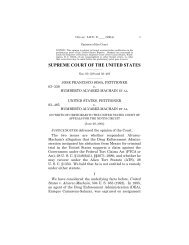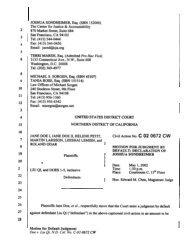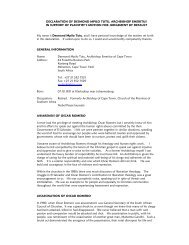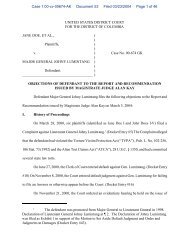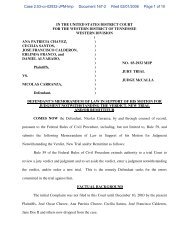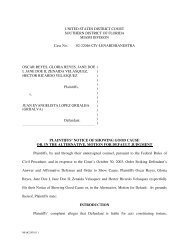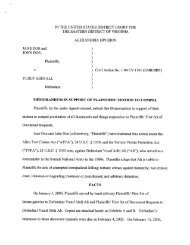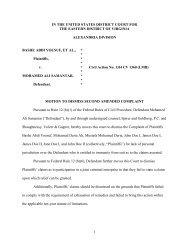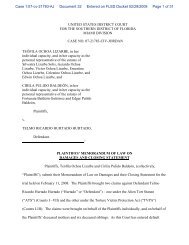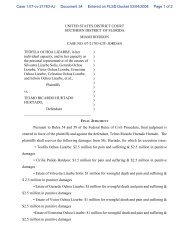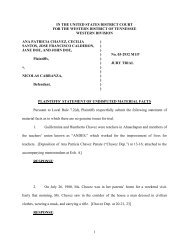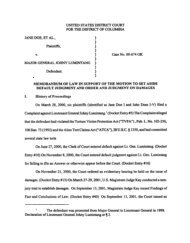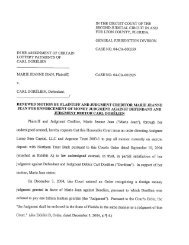Petitioner, v. Respondents. - Center for Justice and Accountability
Petitioner, v. Respondents. - Center for Justice and Accountability
Petitioner, v. Respondents. - Center for Justice and Accountability
You also want an ePaper? Increase the reach of your titles
YUMPU automatically turns print PDFs into web optimized ePapers that Google loves.
25Reading the Act to preclude this Court from reviewingthe decision below would raise grave constitutional questions.For example, this Court has never held that Congress’power to make “Exceptions” to this Court’s appellatejurisdiction is plenary. U.S. CONST. art. III, § 2, cl. 2. To thecontrary, every time this Court has upheld a congressionallimitation, it has gone out of its way to confirm that analternative avenue of contemporaneous appellate review wasavailable. Felker, 518 U.S. at 661-62; id. at 667 (Souter, J.,concurring) (“if it should later turn out that statutoryavenues other than certiorari <strong>for</strong> reviewing [a lower court’shabeas denial] were closed, the question whether the statuteexceeded Congress’s Exceptions Clause power would beopen”); Yerger, 75 U.S. at 105-06; McCardle, 74 U.S. at 515.Moreover, Congress may not use its power under theExceptions Clause “to withhold appellate jurisdiction…as ameans to an end.” United States v. Klein, 80 U.S. 128, 145(1872). 23 As Professor Hart wrote a half-century ago, in lightof Klein <strong>and</strong> the constitutional structure that ordains onlyone Supreme Court, Congress’ exercise of its Exceptionspower must not “destroy the essential role of the SupremeCourt in the constitutional plan.” Hart, supra, at 1365. 24 Yetthe government seeks that result in arguing that the DTACourt.” James Pf<strong>and</strong>er, Jurisdiction-Stripping <strong>and</strong> the Supreme Court’s PowerTo Supervise Inferior Tribunals, 78 TEX. L. REV. 1433, 1500 (2000) (citingFelker, 518 U.S. at 665-66 (Stevens, J., concurring)).23 “[I]t has become something of a time-honored tradition <strong>for</strong> theSupreme Court <strong>and</strong> lower federal courts to find that Congress did notintend to preclude altogether judicial review of constitutional claims.…”Bartlett v. Bowen, 816 F.2d 695, 699 (D.C. Cir. 1987); cf. Battaglia v. Gen.Motors Corp., 169 F.2d 254, 257 (2d Cir. 1948).24 “[T]he Supreme Court’s precedential authority over inferior federalcourts…makes little practical sense unless combined with wide-rangingjurisdiction over federal law questions. Congress might shrink the Court’sappellate jurisdiction, but the Exceptions Clause does not empower it todeprive the judiciary of the Court’s basic leadership.” Evan Caminker,Why Must Inferior Courts Obey Superior Court Precedents?, 46 STAN. L. REV.817, 835 (1994). “[T]he Court’s supremacy gives it authority to supervisethe work of inferior federal tribunals through the exercise of its power toissue discretionary writs, such as m<strong>and</strong>amus, habeas corpus, <strong>and</strong>prohibition.” Pf<strong>and</strong>er, supra, at 1441.




